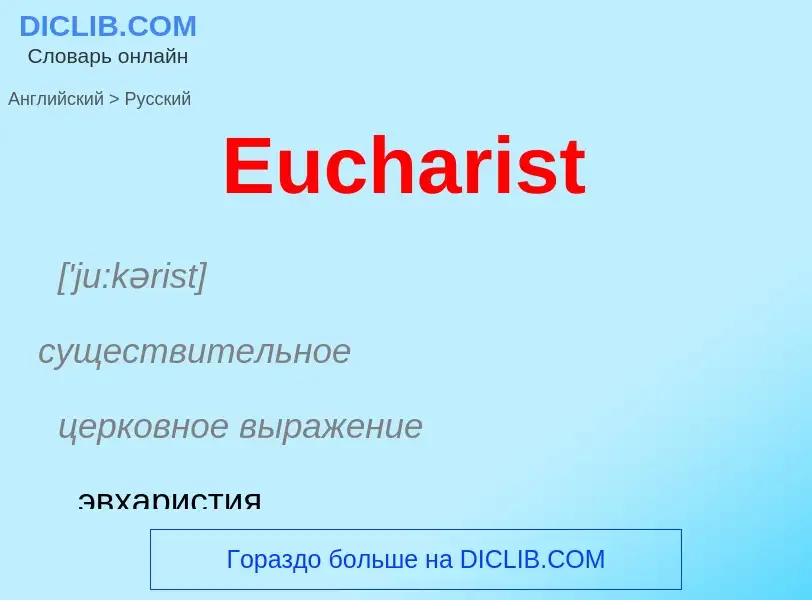Traducción y análisis de palabras por inteligencia artificial ChatGPT
En esta página puede obtener un análisis detallado de una palabra o frase, producido utilizando la mejor tecnología de inteligencia artificial hasta la fecha:
- cómo se usa la palabra
- frecuencia de uso
- se utiliza con más frecuencia en el habla oral o escrita
- opciones de traducción
- ejemplos de uso (varias frases con traducción)
- etimología
Eucharist - traducción al Inglés
['ju:kərist]
существительное
церковное выражение
эвхаристия
(святое) причастие
святые дары
(eucharist) благодарственный молебен
евхаристия, причастие
[ju:kə'ristik-{ju:kə'ristik}(ə)l]
прилагательное
церковное выражение
(обыкн. Eucharistic
Eucharistical) евхаристический
причастный
относящийся к (святому) причастию
благодарственный (о молебне)
Definición
Wikipedia

The Eucharist (; from Koinē Greek: εὐχαριστία, romanized: evcharistía, lit. 'thanksgiving'), also known as Holy Communion and the Lord's Supper, is a Christian rite that is considered a sacrament in most churches, and as an ordinance in others. Several passages in the New Testament attest that the rite was instituted by Jesus Christ during the Last Supper, the night before his crucifixion, giving his disciples bread and wine; he commanded them to "do this in memory of me" while referring to the bread as "my body" and the cup of wine as "the blood of my covenant, which is poured out for many". According to the Synoptic Gospels this was at a Passover meal.
The elements of the Eucharist, sacramental bread (leavened or unleavened) and wine (or non-alcoholic grape juice in some Protestant traditions), are consecrated on an altar or a communion table and consumed thereafter. Christians generally recognize a special presence of Christ in this rite, though they differ about exactly how, where, and when Christ is present.
The Catholic Church states that the Eucharist is the body and blood of Christ under the species of bread and wine. It maintains that by the consecration, the substances of the bread and wine actually become the substances of the body and blood of Jesus Christ (transubstantiation) while the appearances or "accidents" of the bread and wine remain unaltered (e.g. colour, taste, feel, and smell). The Eastern Orthodox and Oriental Orthodox churches agree that an objective change occurs of the bread and wine into the body and blood of Christ. Lutherans believe the true body and blood of Christ are really present "in, with, and under" the forms of the bread and wine (sacramental union). Reformed Christians believe in a real spiritual presence of Christ in the Eucharist. Anglican eucharistic theologies universally affirm the real presence of Christ in the Eucharist, though Evangelical Anglicans believe that this is a spiritual presence, while Anglo-Catholics hold to a corporeal presence. Others, such as the Plymouth Brethren, take the act to be only a symbolic reenactment of the Last Supper and a memorial. As a result of these different understandings, "the Eucharist has been a central issue in the discussions and deliberations of the ecumenical movement."


![Sanctuary of Our Lady of Fátima]]. Sanctuary of Our Lady of Fátima]].](https://commons.wikimedia.org/wiki/Special:FilePath/20190529 Spain and Portugal El Camino Pilgrimage 1063 (48002601588).jpg?width=200)

![[[Pope Benedict XVI]] celebrates a Mass. [[Pope Benedict XVI]] celebrates a Mass.](https://commons.wikimedia.org/wiki/Special:FilePath/BentoXVI-51-11052007 (frag).jpg?width=200)
![Eucharistic window (1898–1900) by [[Józef Mehoffer]] Eucharistic window (1898–1900) by [[Józef Mehoffer]]](https://commons.wikimedia.org/wiki/Special:FilePath/Cathedral Fribourg vitrail Eucharistie 01.jpg?width=200)

![At a Solemn [[Tridentine Mass]], the Host is displayed to the people before Communion. At a Solemn [[Tridentine Mass]], the Host is displayed to the people before Communion.](https://commons.wikimedia.org/wiki/Special:FilePath/Ecce Agnus Dei.jpg?width=200)
![Western]] [[Catholic Church]], the administration of the Eucharist to children requires that they have sufficient knowledge and careful preparation to receive the body of Christ with faith and devotion. Western]] [[Catholic Church]], the administration of the Eucharist to children requires that they have sufficient knowledge and careful preparation to receive the body of Christ with faith and devotion.](https://commons.wikimedia.org/wiki/Special:FilePath/Eucharist001.jpg?width=200)
![The Eucharist displayed in a [[monstrance]], flanked by candles The Eucharist displayed in a [[monstrance]], flanked by candles](https://commons.wikimedia.org/wiki/Special:FilePath/Eucharistic Adoration.jpg?width=200)
![1845 illustrated ''Book of Common Prayer'']]. 1845 illustrated ''Book of Common Prayer'']].](https://commons.wikimedia.org/wiki/Special:FilePath/Holy Communion, Owen Jones.png?width=200)
![''Christ with the Eucharist'', [[Vicente Juan Masip]], 16th century. ''Christ with the Eucharist'', [[Vicente Juan Masip]], 16th century.](https://commons.wikimedia.org/wiki/Special:FilePath/Juan de Juanes 002.jpg?width=200)
![A [[Kremikovtsi Monastery]] fresco (15th century) depicting the [[Last Supper]] celebrated by Jesus and his disciples. The early Christians too would have celebrated this meal to commemorate Jesus' death and subsequent resurrection. A [[Kremikovtsi Monastery]] fresco (15th century) depicting the [[Last Supper]] celebrated by Jesus and his disciples. The early Christians too would have celebrated this meal to commemorate Jesus' death and subsequent resurrection.](https://commons.wikimedia.org/wiki/Special:FilePath/Last-supper-from-Kremikovtsi.jpg?width=200)



![Many Presbyterian churches historically used [[communion token]]s to provide entrance to the Lord's Supper. Many Presbyterian churches historically used [[communion token]]s to provide entrance to the Lord's Supper.](https://commons.wikimedia.org/wiki/Special:FilePath/South Leith communion token reverse.jpg?width=200)
![Last Supper]]''. Last Supper]]''.](https://commons.wikimedia.org/wiki/Special:FilePath/Última Cena - Juan de Juanes.jpg?width=200)
